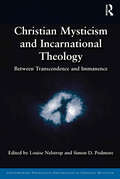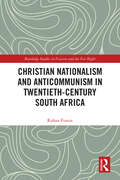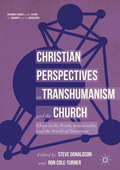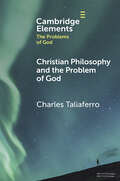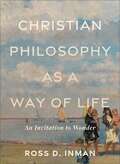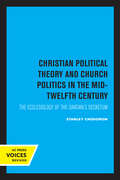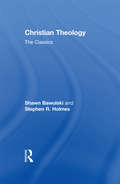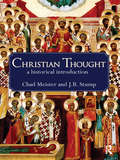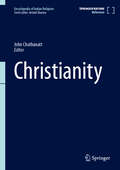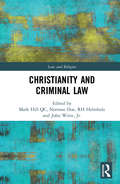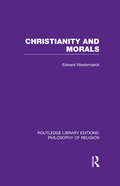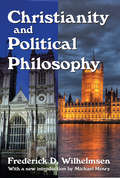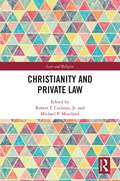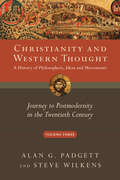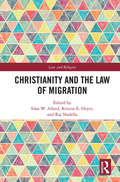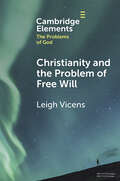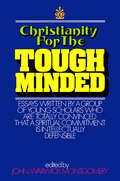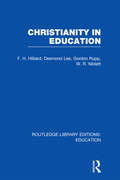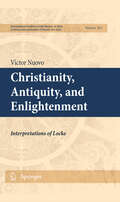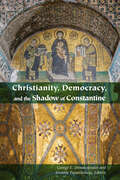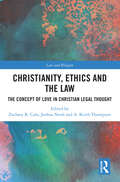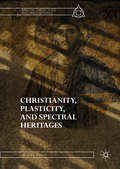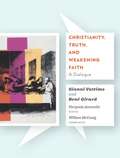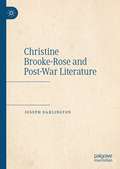- Table View
- List View
Christian Mysticism and Incarnational Theology: Between Transcendence and Immanence (Contemporary Theological Explorations in Mysticism)
by Simon D. Podmore Louise NelstropThis book examines the relationship between transcendence and immanence within Christian mystical and apophatic writings. Original essays from a range of leading, established, and emerging scholars in the field focus on the roles of language, signs, and images, and consider how mystical theology might contribute to contemporary reflection on the Word incarnate. This collection of essays re-examines works from such canonical figures as Eckhart, Augustine, Plotinus, Pseudo-Dionysius, Nicolas of Cusa, Teresa of Avila, John of the Cross, Julian of Norwich, along with the philosophical thought of Iris Murdoch, Jacques Lacan, and Martin Heidegger, and the contemporary phenomena of the Emerging Church. Presenting new readings of key ideas in mystical theology, and renewed engagement with the visionary and the everyday, the therapeutic and the transformative, these essays question how we might think about what may lie between transcendence and immanence.
Christian Nationalism and Anticommunism in Twentieth-Century South Africa (Routledge Studies in Fascism and the Far Right)
by Ruhan FourieThis book investigates Afrikaner anticommunism in South Africa in the twentieth century, focusing on the Dutch Reformed Church (DRC).Following contemporary understandings of anticommunism as a fluid ideological stance, it demonstrates that the deeply held anticommunist convictions of ordinary twentieth-century Afrikaners is more than merely a natural result of global politics. It examines how the DRC, the institution with the widest reach and deepest influence in the everyday lives of Afrikaners, played a significant role in perpetuating an anticommunist imagination amongst twentieth-century Afrikaners. The text explores the critical role the DRC fulfilled in legitimising overt opposition to and suppression of ‘communism’ in all its perceived manifestations, including black dissent, whilst also creating an Afrikaner imagination in which the volk remained convinced of the ever- present communist threat, and of its own role as a bulwark against communism. The church’s moral standing in Afrikaner society also made it susceptible to right-wing opportunists gaining mainstream political clout, which this monograph also exposes and explains. It ultimately concludes that anticommunism functioned as a vehicle for nationalist unity (and uniformity), a paradigm for Afrikaner identity, and a legitimiser of the volk’s perceptions of its imagined moral high ground throughout the twentieth century.It will appeal to readers interested in anticommunism, Christian nationalism, right-wing networks, racism, and apartheid culture and society.
Christian Perspectives on Transhumanism and the Church: Chips In The Brain, Immortality, And The World Of Tomorrow (Palgrave Studies In The Future Of Humanity And Its Successors Ser.)
by Steve Donaldson Ron Cole-TurnerChristians have always been concerned with enhancement—now they are faced with significant questions about how technology can help or harm genuine spiritual transformation. What makes traditional and technological enhancement different from each other? Are there theological insights and spiritual practices that can help Christians face the challenge of living in a technological world without being dangerously conformed to its values? This book calls on Christians to understand and engage the deep issues facing the church in a technological, transhumanist future.
Christian Philosophy and the Problem of God (Elements in the Problems of God)
by Charles TaliaferroQuestions are raised about Christian philosophy and God. Is Christian philosophy truly philosophical? Is it Biblical? Is it capable of addressing God, a profoundly transcendent being? Does appealing to a God's eye point of view make sense? Can Christian philosophy respect religious diversity? While the integrity of Christian philosophy is defended, questions are raised about its relationship to the overall practice of philosophy. Christian philosophers value drawing others to Christian faith. Are Christian apologetics compatible with philosophy? This Element concludes with reflection on when it may be philosophically acceptable to appeal to mystery.
Christian Philosophy as a Way of Life: An Invitation to Wonder
by Ross D. InmanThis brief, accessible introduction shows that philosophy is valuable, practical, and significant for every aspect of Christian life and ministry. Philosophy is often seen as anything but practically relevant to everyday life. In this brief, accessible introduction, Ross Inman explores four hidden assumptions that lurk behind questions involving philosophy's relevance. He shows that philosophy is one of most practical subjects of study, for it satisfies our deep human need to make sense of it all. <P><P>This book recovers a more classical vision of Christian philosophy as an entire way of life. Inman shows that wonder is the distinctively human posture that drives and sustains the examined life and makes a compelling case that philosophy is valuable, practical, and significant for every aspect of Christian life and ministry. Living philosophically as a Christian enables us to be properly attuned to what is true and good in Christ and to orient our lives to the highest goals worth pursuing. This is an ideal introductory book for students of philosophy, Christian thought, and worldview studies. It will also work well in classical school, high school, and homeschool contexts.
Christian Political Theory and Church Politics in the Mid-Twelfth Century: The Ecclesiology of the Gratian's Decretum
by Stanley ChodorowThis title is part of UC Press's Voices Revived program, which commemorates University of California Press’s mission to seek out and cultivate the brightest minds and give them voice, reach, and impact. Drawing on a backlist dating to 1893, Voices Revived makes high-quality, peer-reviewed scholarship accessible once again using print-on-demand technology. This title was originally published in 1972.
Christian Theology: The Classics
by Stephen Holmes Shawn BawulskiChristian Theology: The Classics is a vibrant introduction to the most important works of theology in the history of Christian thought. Exploring writings from the origins of Christianity to the present day, it examines some of the most influential theologians of all time, considering the context in which they were writing and the lasting significance of their work. Covering thirty-one theological classics such as: • Augustine of Hippo, On the Trinity • Martin Luther, Commentary on Galatians • John Calvin, The Institutes of The Christian Religion • Jonathan Edwards, Religious Affections • St Thomas Aquinas, Summa Theologiae With a glossary and outlines of the key criticisms of each text, this book is the perfect starting point for anyone interested in Theology and the history of Christian thought.
Christian Thought: A Historical Introduction
by Chad Meister James StumpThe story of Christian thought is essential to understanding Christian faith today and the last two millennia of world history. This fresh and lively introduction explores the central ideas, persons, events, and movements that gave rise to Christian thought, from early beginnings to its present forms. By highlighting the important but often neglected role of women and the influence of non-Christian ideas and movements, this book provides a broader context for understanding the history of Christian ideas and their role in shaping our world. This work chronicles the impressive developments of Christian thinking which arose from these contexts and have transcended the ages. Christian Thought: provides an overview of the context of Christianity’s origin, including discussion of the influence of Hebrews, Greeks, and Romans in the ancient world and the founding figures of Jesus and Paul explores the major events and figures of the history of Christian thought, while drawing attention to significant voices which have often been suppressed analyses the impact on Christian thought of widely discussed events such as The Great Schism, the Scientific Revolution, and Modernism surveys contemporary trends such as fundamentalism, feminism, and postmodernism. Complete with illustrations, timelines and maps, this is an ideal resource for anyone wanting to learn more about the development of Christian thought and its influence over the centuries.
Christianity (Encyclopedia of Indian Religions)
by John ChathanattPublished in the Series Encyclopedia of Indian Religions, this volume is devoted to Christianity in India, where it has had a long presence, going back to the time of the apostles of Jesus Christ. Divided into two parts, this volume focuses on the history, origin, organizations and local engagements, belief system, worship practices, Rites, Rituals, Christian life, Contributions, Spirituality and a few of the main doctrinal items. The Second Part covers the doctrinal and theological arena. It examines the earlier phase of the history of Christianity starting with the traditional belief of the arrival of St. Thomas in AD 52, moving to the periods of its association with the Chaldean church, the Portuguese, the Dutch, English and so on. This volume highlights the missionary activities of persons like St. Francis Xavier, the creative contributions made to the inter-religious dialogue by such people as Roberto de Nobili (1577-1656) and Swami Abhishiktananda (1910-1973), the linguistic and educational contributions of some of the pioneers like the German Jesuit Johanne Ernst Hanxleden (known as Arnos Padiri) (1681-1732), Herman Gundert (1814-1893), St. Elias Kuriakos Chavara (1805-1871), and, a fortiori, the enormous contributions in the healthcare area throughout the country. Caring for and serving the socio-economically marginalized ones, the peripheralized people formed an integral part of the Christian activity In India, as it is done even today. This is highlighted very much in the volume. It, further, explores the contact India had with European Christianity, showing that European Christianity proved to have wider influence in the Norther part of India, unlike India’s early episodic encounters with Palestinian and Persian forms of Christianity, which had deep influence in the Southern part of India. The volume also highlights the inner struggle among the followers resulting even in its division originating at the Synod of Diamper in 1599 manifesting, by and large, the Church-state ‘love and hate’ relationships. In fine, in spite of the drawbacks of putting the herculean task of two thousand years of history in eight hundred pages or so, this volume gives a rather comprehensive view of Christianity in India especially to those who are unfamiliar with its life and dynamics in the Indian context. The wide range of photographs, especially of the churches revealing the architectural beauty and multiplicity along with the ensample of art and paintings and pilgrimage centers adds to the enrichment of the volume.
Christianity and Criminal Law (Law and Religion)
by John Witte Jr Norman Doe Mark Hill Qc Rh HelmholzThis collection, by leading legal scholars, judges and practitioners, together with theologians and church historians, presents historical, theological, philosophical and legal perspectives on Christianity and criminal law. Following a Preface by Lord Judge, formerly Lord Chief Justice of England and Wales, and an introductory chapter, the book is divided into four thematic sections. Part I addresses the historical contributions of Christianity to criminal law drawing on biblical sources, early church fathers and canonists, as far as the Enlightenment. Part II, titled Christianity and the principles of criminal law, compares crime and sin, examines concepts of mens rea and intention, and considers the virtue of due process within criminal justice. Part III looks at Christianity and criminal offences, considering their Christian origins and continuing relevance for several basic crimes that every legal system prohibits. Finally, in Part IV, the authors consider Christianity and the enforcement of criminal law, looking at defences, punishment and forgiveness. The book will be an invaluable resource for students and academics working in the areas of Law and Religion, Legal Philosophy and Theology.
Christianity and Morals (Routledge Library Editions: Philosophy of Religion)
by Edward Alexander WestermarckA thorough examination of many aspects of morality through the lens of Christianity, this book, originally published in 1939, is philosophical in its approach to assessing religion. It compares moral traditions of many world religions and describes their changes over time as well. Written accessibly, this is a fascinating outlay of moral theology.
Christianity and Political Philosophy (Library Of Conservative Thought Ser.)
by Frederick D. WilhelmsenEach chapter in Christianity and Political Philosophy addresses a philosophical problem generated by history. Frederick D. Wilhelmsen discusses the limits of natural law; Cicero and the politics of the public orthodoxy; the problem of political power and the forces of darkness; Sir John Fortescue and the English tradition; Donoso Cortes and the meaning of political power; the natural law tradition and the American political experience; Eric Voegelin and the Christian tradition; and Jaffa, the School of Strauss, and the Christian tradition.Wilhelmsen is convinced that mainstream philosophy's suppression of the Christian experience, or its reduction of Christianity to myths, deprives both Christianity and philosophy. He argues that Christianity opened up an entirely new range of philosophical questions and speculation that today are part and parcel of the intellectual tradition of the West.Wilhelmsen remains relevant because political philosophy in America today is following the historic cycle of political philosophy's importance: as things get worse for the nation because it is internally riven by ideological and spiritual conflicts, there is a greater need for the political philosopher to raise and explore profound questions and reassert forgotten truths about man and society, the soul and God, and good and evil, as well as the ground of political order. This is the latest book in Transaction's esteemed Library of Conservative Thought series.
Christianity and Private Law (Law and Religion)
by Robert F. Cochran Jr. Michael P. MorelandThis volume examines the relationship between Christian legal theory and the fields of private law. Recent years have seen a resurgence of interest in private law theory, and this book contributes to that discussion by drawing on the historical, theological, and philosophical resources of the Christian tradition. The book begins with an introduction from the editors that lays out the understanding of "private law" and what distinguishes private law topics from other fields of law. This section includes two survey chapters on natural law and biblical sources. The remaining sections of the book move sequentially through the fields of property, contracts, and torts. Several chapters focus on historical sources and show the ways in which the evolution of legal doctrine in areas of private law has been heavily influenced by Christian thinkers. Other chapters draw out more contemporary and public policy-related implications for private law. While this book is focused on the relationship of Christianity to private law, it will be of broad interest to those who might not share that faith perspective. In particular, legal historians and philosophers of law will find much of interest in the original scholarship in this volume. The book will be attractive to teachers of law, political science, and theology. It will be of special interest to the many law faculty in property, contracts, and torts, as it provides a set of often overlooked historical and theoretical perspectives on these fields.
Christianity and Western Thought: Journey to Postmodernity in the Twentieth Century (Christianity Western Thought #Volume 3)
by Steve Wilkens Alan G. PadgettChristianity Western Thought, Volume 1: From the Ancient World to the Age of Enlightenment
Christianity and the Law of Migration (Law and Religion)
by Silas W. Allard; Kristin E. Heyer; Raj NadellaThis collection brings together legal scholars and Christian theologians for an interdisciplinary conversation responding to the challenges of global migration. Gathering 14 leading scholars from both law and Christian theology, the book covers legal perspectives, theological perspectives, and key concepts in migration studies. In Part 1, scholars of migration law and policy discuss the legal landscape of migration at both the domestic and international level. In Part 2, Christian theologians, ethicists, and biblical scholars draw on the resources of the Christian tradition to think about migration. In Part 3, each chapter is co-authored by a scholar of law and a scholar of Christian theology, who bring their respective resources and perspectives into conversation through a conversation on key themes within migration studies. The work provides a truly interdisciplinary introduction to the topic of migration for those who are new to the subject; an opportunity for immigration lawyers and legal scholars to engage Christian theology; an opportunity for pastors and Christian theologians to engage law; and new insights on key frameworks for scholars who are already committed to the study of migration.
Christianity and the Problem of Free Will (Elements in the Problems of God)
by Leigh VicensCentral to the teachings of Christianity is a puzzle: on the one hand, sin seems something that humans do not do freely and so cannot be not responsible for, since it is unavoidable; on the other hand, sin seems something that we must be responsible for and so do freely, since we are enjoined to repent of it, and since it makes us liable to divine condemnation and forgiveness. After laying out the puzzle in more depth, this Element considers three possible responses—libertarian, soft determinist, and free-will skeptic—and weighs the costs and benefits of each.
Christianity for the Tough Minded: Essays Written by a Group of Young Scholars Who are Totally Convinced That A Spiritual Commitment Is Intellectually Defensible
by John Warwick MontgomeryA collection of 24 essays that provide wide-ranging evidence for the intellectual respectability of the Christian faith, along with critiques of Bertrand Russell, Julian Huxley, Herbert Marcuse, Eric Hoffer, Franz Kafka, Hermann Hesse, and Ayn Rand.
Christianity in Education: The Hibbert Lectures 1965 (Routledge Library Editions: Education)
by Desmond Lee F. H. Hilliard Gordon Rupp W. R. NiblettThe Christian churches have frequently pioneered educational advances – from the seventh century down to the nineteenth. Schools, universities and colleges of education stand as tangible evidence of these efforts. Do all these ventures belong merely to educational history – relics of the days when Christianity was influential enough to play a leading part in education? Or has Christianity still a distinctive contribution to make to educational thought and practice? The educationalists who contributed to the Hibbert Lectures of 1965 are convinced that it has. They examine the nature of this contribution and show how it is to be made a time when education seems to be mainly influenced by secular rather than religious assumptions and aims. The six lectures fall into two main parts. Christianity in the schools is the theme of the first three; Christianity in higher education that of the last three.
Christianity, Antiquity, and Enlightenment: Interpretations of Locke (International Archives of the History of Ideas Archives internationales d'histoire des idées #203)
by Victor NuovoThe volume will consist of a series of interpretative studies of Locke's philosophical and religious thought in historical context and consider his contributions to the Enlightenment and modern liberal thought.
Christianity, Democracy, and the Shadow of Constantine (Orthodox Christianity and Contemporary Thought)
by George E. Demacopoulos and Aristotle PapanikolaouWinner of the 2017 Alpha Sigma Nu AwardThe collapse of communism in eastern Europe has forced traditionally Eastern Orthodox countries to consider the relationship between Christianity and liberal democracy. Contributors examine the influence of Constantinianism in both the post-communist Orthodox world and in Western political theology. Constructive theological essays feature Catholic and Protestant theologians reflecting on the relationship between Christianity and democracy, as well as Orthodox theologians reflecting on their tradition’s relationship to liberal democracy. The essays explore prospects of a distinctively Christian politics in a post-communist, post-Constantinian age.
Christianity, Ethics and the Law: The Concept of Love in Christian Legal Thought (Law and Religion)
by Zachary R. Calo, Joshua Neoh and A. Keith ThompsonThis book examines how Christian love can inform legal thought. The work introduces love as a way to advance the emergent conversation between constructive theology and jurisprudence that will also inform conversations in philosophy and political theory. Love is the central category for Christian ethical understanding. Yet, the growing field of law and religion, and relatedly law and theology, rarely address how love can shape our understanding of law. This reflects, in part, a common assumption that law and love stand in necessary tension. Love applies to the private and the personal. Law, by contrast, applies to the public and the political, realms governed by power. It is thus a mistake to envisage love as having anything but a negative relationship to law. This conclusion continues to govern Christian understandings of the meaning and vocation of law. The animating idea of this volume is that the concept of love can and should inform Christian legal thought. The project approaches this task from the perspective of both historical and constructive theology. Various contributions examine how such thinkers as Augustine, Aquinas, and Calvin utilised love in their legal thought. These essays highlight often neglected aspects of the Christian tradition. Other contributions examine Christian love in light of contemporary legal topics including civility, forgiveness, and secularism. Love, the book proposes, not only matters for law but can transform the terms on which Christians understand and engage it.? The book will be of interest to academics and researchers working in the areas of legal theory; law and religion; law and philosophy; legal history; theology and religious studies; and political theory.
Christianity, Plasticity, and Spectral Heritages (Radical Theologies and Philosophies)
by Victor E. TaylorThis book is an interdisciplinary study of the cultural representations of Jesus in the context of contemporary religious theory and continental philosophy. It looks at Jesus in view of an updated Derridean hauntology and spectrality, with an emphasis on the inherent plasticity of the Christian heritage. While the work engages with the recent Jesus-centered writings of Slavoj Žižek, Fran#65533;ois Laruelle, and Giorgio Agamben, it places a greater and much needed emphasis on the philosophical, theological, and cultural links between a plastic, hauntological Christian heritage and Jesus's historically evolving plural subjectivity, with the latter explored in texts of popular culture. It is a multidisciplinary study of Jesus, as well as a dynamic Christian heritage that simultaneously constructs and deconstructs Jesus's philosophical, political, and cultural centrality.
Christianity, Truth, and Weakening Faith: A Dialogue
by Gianni Vattimo Rene Girard Pierpaolo AntonelloThe debate over the place of religion in secular, democratic societies dominates philosophical and intellectual discourse. These arguments often polarize around simplistic reductions, making efforts at reconciliation impossible. Yet more rational stances do exist, positions that broker a peace between relativism and religion in people's public, private, and ethical lives. Christianity, Truth, and Weakening Faithadvances just such a dialogue, featuring the collaboration of two major philosophers known for their progressive approach to this issue. Seeking unity over difference, Gianni Vattimo and René Girard turn to Max Weber, Eric Auerbach, and Marcel Gauchet, among others, in their exploration of truth and liberty, relativism and faith, and the tensions of a world filled with new forms of religiously inspired violence. Vattimo and Girard ultimately conclude that secularism and the involvement (or lack thereof) of religion in governance are, in essence, produced by Christianity. In other words, Christianity is "the religion of the exit from religion," and democracy, civil rights, the free market, and individual freedoms are all facilitated by Christian culture. Through an exchange that is both intimate and enlightening, Vattimo and Girard share their unparalleled insight into the relationships among religion, modernity, and the role of Christianity, especially as it exists in our multicultural world.
Christianity, Truth, and Weakening Faith: A Dialogue
by Gianni Vattimo René GirardThe debate over the place of religion in secular, democratic societies dominates philosophical and intellectual discourse. These arguments often polarize around simplistic reductions, making efforts at reconciliation impossible. Yet more rational stances do exist, positions that broker a peace between relativism and religion in people's public, private, and ethical lives.Christianity, Truth, and Weakening Faith advances just such a dialogue, featuring the collaboration of two major philosophers known for their progressive approach to this issue. Seeking unity over difference, Gianni Vattimo and René Girard turn to Max Weber, Eric Auerbach, and Marcel Gauchet, among others, in their exploration of truth and liberty, relativism and faith, and the tensions of a world filled with new forms of religiously inspired violence. Vattimo and Girard ultimately conclude that secularism and the involvement (or lack thereof) of religion in governance are, in essence, produced by Christianity. In other words, Christianity is "the religion of the exit from religion," and democracy, civil rights, the free market, and individual freedoms are all facilitated by Christian culture. Through an exchange that is both intimate and enlightening, Vattimo and Girard share their unparalleled insight into the relationships among religion, modernity, and the role of Christianity, especially as it exists in our multicultural world.
Christine Brooke-Rose and Post-War Literature
by Joseph DarlingtonThis book utilizes archive research, interviews and historical analysis to present a comprehensive overview of the works of Christine Brooke-Rose. A writer well-known for her idiosyncratic and experimental approaches to the novel form; this work traces her development from her early years as a social satirist, through her space-aged experimentalism in the 1960s, to her later poststructuralism and interest in digital computing and genetics. The book gives an overview of her writing and intellectual career with new archival research that places Brooke-Rose’s work in the context of the historically important events in which she was a participant: Bletchley Park codebreaking in the Second World War, the events in Paris during May 1968, the dawning of the internet and the rise of poststructuralism. Joseph Darlington begins with Brooke-Rose’s first novels written in the late 1950s of social satire, studies her experimental phase of writing and finally illuminates her unique approach to autobiography, arguing for reevaluating this interdisciplinary author and her contribution to poststructuralism, life writing and post-war literature.
